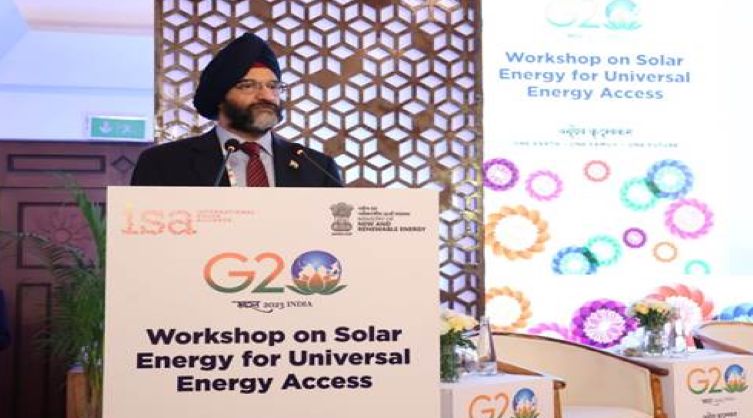Solar Mini-grids Vital for Achieving Universal Energy Access by 2030
By EPR Magazine Editorial July 27, 2023 12:00 pm IST
By EPR Magazine Editorial July 27, 2023 12:00 pm IST

G20 side event releases roadmap for solar energy and universal energy access.
Recently, at a side-event of the 4th Energy Transition Working Group in Goa, the Ministry of New and Renewable Energy (MNRE) of the Government of India, in collaboration with the International Solar Alliance, unveiled a Roadmap for Solar Energy to achieve Universal Energy Access. The event featured a workshop and panel discussion that deliberated on energy access challenges and potential solutions.
Addressing the workshop, Bhupinder Singh Bhalla, Secretary of MNRE, emphasised the significance of providing reliable, sustainable, and affordable energy access to all, as it is critical for global energy transition. India has set ambitious goals for its clean energy transition, with plans to achieve 50percentage of cumulative electric power installed capacity from non-fossil fuel-based energy sources by 2030. Among various renewable technologies, solar energy stands out as a key player in driving energy access, security, and transition globally. The ‘Roadmap of Solar Energy for Universal Energy Access,’ developed under India’s G20 presidency in 2023, ai to showcase how solar energy can contribute to electricity access and socio-economic benefits worldwide.
Dr. Ajay Mathur, Director General of the International Solar Alliance, highlighted the pressing need for energy access, particularly in sub-Saharan Africa and rural areas. Solar energy, coupled with battery storage, is emerging as an optimal choice for electrification, especially in remote areas beyond the grid. It offers technical, financial, and social benefits, and a combination of electrification approaches centered on solar energy can address energy access challenges in various situations.
Puneet Kumar Goel, Chief Secretary of the Government of Goa, discussed the advantages of decentralised solar mini-grids, particularly in regions where diesel generators result in high electricity costs. India has ambitious targets for decentralised solar, and support through Feed-in Tariffs and tariff restructuring for grid-connected decentralised solar capacity can promote its deployment. Additionally, battery costs are expected to decrease with large-scale procurement, further supporting the development of solar mini-grids.Damilola Ogunbiyi, CEO and Special Representative of the UN Secretary-General for Sustainable Energy for All (SEforALL) and Co-Chair of UN Energy, emphasised the transformative potential of solar energy in uplifting vulnerable populations. However, she highlighted the need for increased investments in the sector and enabling policies and regulations to support solar energy’s deployment for universal energy access.
Based on the Roadmap of Solar Energy for Universal Energy Access, around 59percentage of the unelectrified population can be best suited for electrification through solar-based mini-grids, 30 percentage through grid extensions, and 11percentage through Decentralised Renewable Energy solutions. To achieve this, a total investment of around USD 192 billion will be required, with financial support of approximately USD 48.5 billion needed for mini-grid deployment. The report emphasises the importance of addressing challenges to sustainably scale up energy access solutions, including policy and regulatory frameworks, risk mitigation measures, and capacity building activities.
The Roadmap sets the stage for accelerated development to achieve universal energy access by 2030, by integrating solar energy solutions with electrification initiatives and promoting global collaborations to bridge energy access gaps.”
We use cookies to personalize your experience. By continuing to visit this website you agree to our Terms & Conditions, Privacy Policy and Cookie Policy.